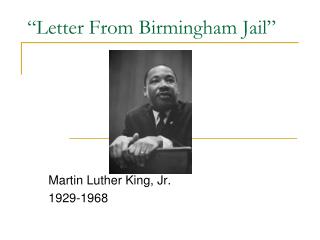

In protest of the laws he considers unjust, King is willing to submit to jail time, an act that shows the highest respect for law the American political process. King also notes that he and other blacks were not able to take part in the formation of these laws-they do not even have the opportunity to vote for their own leaders and lawmakers-and therefore the laws are not created within a truly democratic system. If the law does not apply equally to white and black citizens, it is an unjust law and should not exist. King’s opposition to the segregation laws are not only religious he notes that an unjust law legalizes difference, allowing a majority in power to place limits on the actions of a minority. Specifically, King notes, “segregation distorts the soul and damages the personality.” There is no justice in a law that is morally wrong or sinful. Segregation laws are therefore unjust, as they do not correspond to the law of God. King explains that laws are manmade but justice is divine, and for a law to truly be considered just, it cannot conflict with moral law. King notes that it is as important to disobey unjust laws as it is to obey just ones as such, he presents various arguments to illustrate the injustice of the segregation laws in the South.

He was protesting laws that he considered fundamentally unjust for a number of reasons this form of civil disobedience is both necessary and patriotic. Despite writing from a prison cell, however, King never considers his actions criminal, and uses his letter to argue that while the protests were illegal, they served a greater sense of justice. writes his letter from a small jail cell in Birmingham, Alabama, imprisoned for protesting racial inequality and segregation as a political and social policy in the South.


 0 kommentar(er)
0 kommentar(er)
